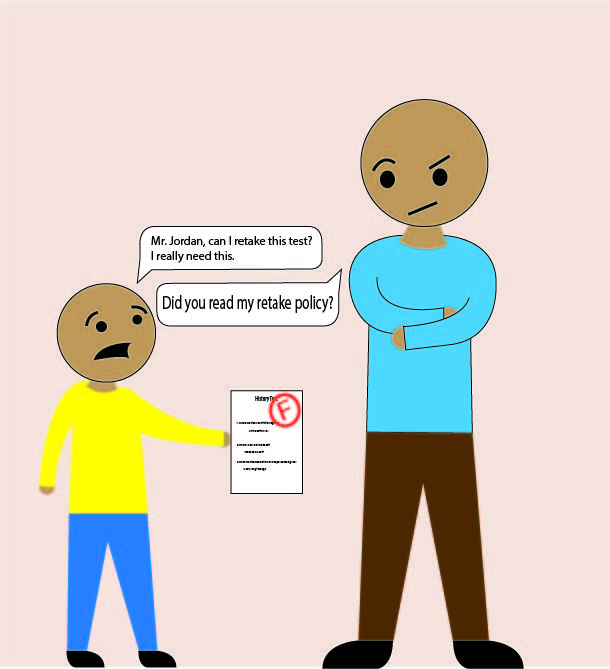Test Retake Policy
February 28, 2022
It is fair to say there are divergent views on test retake policies. Different schools have various policies, of course, but sometimes within the same school and different grades the policies differ, especially with the variety of subjects.
Many debate whether test retakes should be allowed in schools. Some think that the score is what you get, while others think a retake gives students a fair opportunity to prove what they know. A lot of students may rely on retakes, while others think of it as a nice advantage to whatever classes they are taking. What can be somewhat challenging or irritating is when different classes within the same subject have different retake policies. Some may think the shift from middle to high school greatly changes retake policies. For example, in middle school you may get retakes in all your classes, while in high school you only get them in a few classes, or there is a different process of what you have to do to be eligible to retake.
One view is that retakes are necessary, as having one test day puts a lot of pressure on that specific day. What if a student comes in especially distracted because of something going on at home? Maybe they have a stomach ache, or maybe they have a test in both Algebra and physics scheduled for the same day, but the night before they also had to finish an essay for literature.
A teacher on Edutopia remarks, “Retakes let students know that I acknowledge their humanity, that we all have bad days.” They add, “I can’t recall the number of times I’ve come to school with a headache or a personal matter that impacted the quality of my instruction.”
It is hard to make a fair policy that works for everyone, as schools have a lot of different students, all with different views on what is fair and how tests or assignments in general should be.
To make retakes fair, junior Kali Kleven thinks you should “be able to take retakes not for full credit but at least for ninety percent.” To add onto Kleven’s point, We Are Teachers states that “some teachers may set a certain percentage cutoff (for example: students must score below a 60%). Others may set a cap to the number of percentage points students can earn.”
This would make sense to the students who got one hundred on the first go around. Would it be fair if students who were retaking later got a better score than they did on the original test? Or at least the same score? Then, it depends if it is even worth retaking if you will only get up to a certain percent. That is where the student’s own preference and opinion comes in.
Sophomore Olivia Erskine points out that “all of my classes have different policies which makes it confusing to keep track of.” She adds, “A retake is really helpful when I don’t get the grade I prepared for. Retakes are good when they are no harm.”
Erskine makes the point that if you retake and you do worse, which grade do you end up with? Some teachers will go with the better score, while others may think you prepared for the retake, they have given you this opportunity, so that is what you will get.
Washington Post adds to the conversation by stating, “Retakes reduce stress and pressure on already anxious students. They believe such policies may allow kids to better comprehend material by repeating it,” and that “proponents of retakes believe they allow students who struggle with test-taking another chance to master the material, and say retakes help with overall retention.” That ties in well with a point from We Are Teachers who says, “Curriculum builds upon itself, so we have to ensure students master all parts.” The question is whether this should be the student’s task in examining what they do not or do understand, and taking action with that, or taking action with that along with a retake opportunity.
On the other side of things, Edutopia says, “Many of my students have candidly admitted that flexible due dates and retake opportunities leave them unmotivated, and therefore they learn less than they could.” A lot of classes will have you put in the work for a retake, whether it be redoing an assignment that did not get the grade you wanted, or having no missing work before retaking. Another point is that “retakes and soft deadlines allow students to procrastinate: Why do school work that can be completed later when they can Snapchat now? Deadlines and one-time testing, on the other hand, provide extrinsic motivation to keep students on task on a regular basis.”
Senior Hunter Fulford agrees with the no-retake idea, saying, “Offering too many retakes somewhat defies the point of having a test, as opposed to just another assignment.” He adds by saying, “I think there shouldn’t be test retakes, and instead teachers should utilize curves or other grade adjustments to make things fair if the class as a whole does especially poorly on an assessment.”
Freshman Silas Sneath ends the conversation with saying he thinks retakes “will stay the same, because there is no reason to change them.” Will policies start to converge over time? Do you feel the test retake policy is likely to change? It’s likely not as that could require a lot of work on the teachers’ part. Do you feel it should? You could bounce back and forth within your own opinion – deciding how to keep a retake fair but also possible. Next time you are taking a test, will you feel refreshed by the fact that you have a retake opportunity, or stressed because you know there is not one?




